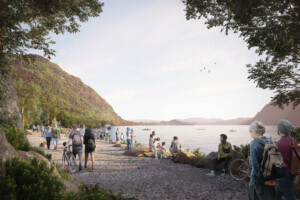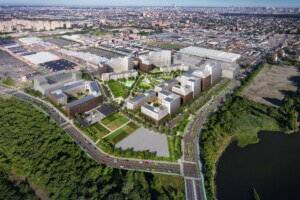Damon Rich, founder of the Center of Urban Pedagogy (CUP) and co-founder of design studio Hector, and Kate Orff, founder of SCAPE, have been honored with 2017 MacArthur Fellowships.
Awarded annually by the John D. and Catherine T. MacArthur Foundation to individuals across a range of fields, the award gifts its fellows a no-strings-attached $625,000 stipend over five years. Unlike other awards, its fellows aren’t selected based on an existing body of work so much as “extraordinary originality” and “a marked capacity for self-direction,” according to the Foundation’s website.
Rich certainly demonstrates both. Trained as an architect at Columbia University, in 1997 Rich founded CUP, a New York City-based nonprofit that develops programs to help community development organizations and public school students address public policy and social justice issues like zoning, tenants’ rights, infrastructure design, and more.
From 2008 to 2015, Rich served as the chief urban designer and director of planning for the City of Newark, New Jersey. During his tenure, he worked with local advocacy groups to redevelop the city’s waterfront as an accessible urban parkway dotted with environmental installations, a process still embroiled in city politics. He also formed a coalition of city-wide organizations to revamp Newark’s obsolete zoning and land-use regulations for the first time in over fifty years.
In 2015, Rich co-founded the design studio Hector with Jae Shin. The firm is currently involved in the redesign of Mifflin Square Park in Philadelphia in addition to ongoing work in Newark and San Francisco. As part of the Philadelphia project, Hector has formed a coalition of local advocacy groups and city agencies to inform the final design, which may incorporate a Buddhist temple, a number of public eateries, and ongoing community programming. Forming these kinds of coalitions has become the backbone of Rich’s work.
“This is one of the most diverse neighborhoods in Philadelphia, with Cambodian, Laotian, Vietnamese, and Bhutanese residents, and many more from a range of backgrounds,” Rich told The Architect’s Newspaper (AN). “Design groups need to have the cultural competence to treat people like they’re people, and bring the spirit and identity of the place into physical form.”
Rich also serves as an adjunct associate professor at Columbia University’s GSAPP program, where he teaches architecture and urban design.
While he didn’t specify how he would use the award, Rich reflected on what it might mean to the next generation. “In public sector work, I’d hope to be one voice standing up for our often beleaguered municipal planners, and encourage youth that this is a career path they might want to be a part of,” Rich said. “I hope this award points to the fact that even though planning departments are very old technologies, there’s still a fundamentally exciting and engrossing potential in any forum where we come together and shape the places we live in.”
Kate Orff is the first landscape architect to ever be awarded the MacArthur prize. Her work at SCAPE has risen to great prominence, with upcoming commissions including participation in the U.S. Pavilion at the 2018 Venice Architecture Biennale. Her emphasis on ecological stewardship, however, sets her apart from peers.
Orff cares deeply about the effects of climate change on the urban fabric, as well as the long-term effects design can have on biodiversity and ecosystem wellness. Her approach also puts some of this responsibility on the users of public spaces, encouraging park-goers and community members to participate in environmental stewardship.
One cornerstone project that helped put Orff’s work on the map was a collaboration with photographer Richard Misrach. In 2012, the two set out to document and quantify the outfall of industrial sites along a chemical corridor known as the “American Ruhr” in the Lower Mississippi River Valley. The resulting book, Petrochemical America, examines the environmental, economic, and public health consequences of pollution in southeastern Louisiana.
SCAPE’s project for President Obama’s Rebuild by Design competition after Hurricane Sandy proposed a series of oyster reefs on Staten Island’s North Shore that would act as wave breakers and water filters, as well as serve as an outdoor classroom to educate youth on marine and coastal ecology. Most recently, SCAPE has completed a design for Lexington, Kentucky’s Town Branch Commons. Their design highlighted the site’s underlying porous limestone in a linear park that stretched through the city.
“I really feel we need to mobilize and understand the best available science, apply it to the built environment, and to anticipate the next 50 years or the next 100 years,” Orff said in her feature on the MacArthur Foundation’s website. “I think we have a huge role to play, not just to beautify but literally to reset ecosystems, to reconnect people to each other through these social spaces that also can perform ecological services.”










